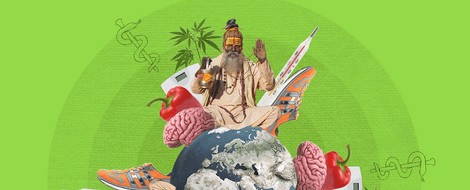Your podcast discovery platform
Curious minds select the most fascinating podcasts from around the world. Discover hand-piqd audio recommendations on your favorite topics.

piqer for: Global finds Health and Sanity Doing Good
Bangalore-based Rashmi Vasudeva's journalism has appeared in many Indian and international publications over the past decade. A features writer with over nine years of experience heading a health and fitness supplement in a mainstream Indian newspaper, her niche areas include health, wellness, fitness, food, nutrition and Indian classical Arts.
Her articles have appeared in various publications including Mint-Wall Street Journal, The Hindu, Deccan Herald (mainstream South Indian newspaper), Smart Life (Health magazine from the Malayala Manorama Group of publications), YourStory (India's media technology platform for entrepreneurs), Avantika (a noir arts and theatre magazine), ZDF (a German public broadcasting company) and others.
In 2006, she was awarded the British Print-Chevening scholarship to pursue a short-term course in new-age journalism at the University of Westminster, U.K. With a double Masters in Globalisation and Media Studies from Aarhus Universitet (Denmark), University of Amsterdam and Swansea University in Wales, U.K., she has also dabbled in academics, travel writing and socio-cultural studies. Mother to a frisky toddler, she hums 'wheels on the bus' while working and keeps a beady eye on the aforementioned toddler's antics.
The Case Of The Vanishing Microbes (And What You Can Do About It)
They are in trillions but maybe because they are invisible, we tend to sidestep their importance. Though there is a lot of talk in recent times about the vital role that gut bacteria plays in our overall physical and mental health, few really are aware of how directly microbes affect every bit of functioning of our bodies. As astonishing as it may sound, microbes inside and on our body contain 20 million genes — and all of these are constantly interacting and controlling our genetic behaviour.
And now, if some worried scientists are to be believed, microbes are disappearing from our bodies — a crisis that some of them believe is similar to climate change and equally hard to comprehend.
What does this actually mean for us? If microbes do the vanishing act, it will have a direct impact on our metabolism; it will greatly reduce the ability of our immune system to ward off infections and it will make our cognition and nervous system that much weaker. Since the majority of microbes are transferred from mother to child, fewer microbes mean fewer transfers.
And why are they vanishing? The scientists think the major reason could be our modern diet. A narrow diet that does not include enough fibre and plant products literally ‘starves’ the microbiome, apart from being the leading cause of lifestyle diseases such as obesity and diabetes. But the good news is that if we make a concerted effort to return to a diverse, fibre-rich diet, the gut’s microbial population can be restored. The other reasons for depletion of microbes include the increase in C-section deliveries (because the baby misses out on the mother’s microbiomes in the birth canal) and the rampant use of antibiotics.
The article goes on to discuss the macro steps the scientific community and policymakers may have to take in the future to prevent an epidemic of loss. For as the scientists put it, “microbes are us ... it is impossible to clearly determine where a human being ends and its microbiome begins.”
